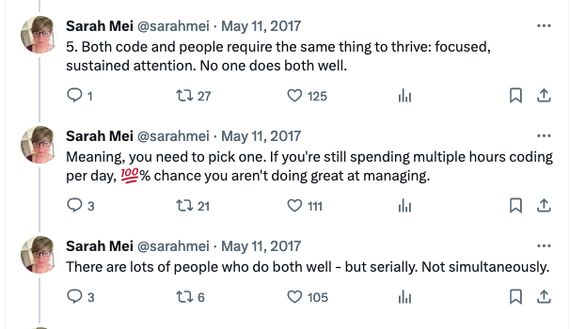There And Back Again - A Data Career Journey
By Alan Hylands

This is Part 2 of a 4 part series, detailing the trials and tribulations of moving from being a data IC to data manager, and back to IC again.
Once upon a time, there was an analyst who became a manager
And they wrote an article about why they did it, and stuck with the decision, through thick and thin, the good times and the bad. And the analyst manager was happy…but not really.
It turned out that the career path that had been laid out in that move into management wasn’t all that it was cracked up to be.
And to be truthful, it hadn’t ever been sold as that in the first place. It was just something you were expected to do.
Want to keep “moving on up”? Get your foot on the first rung of that ladder and start climbing. Get on up there.
Moving up or holding on for grim death?
But what happens when you’ve done it for a few years and every day is becoming a grind?
What got you here is not what will get you to the next level…if you even want that. And the skills you mastered in your previous glorious Individual Contributor (IC) adventures will have started to dull and fade.
What if you could do a Cher and turn back time, casting off the shackles of your management prison and jumping back into being an IC?
Is that even an option? And, if so, what would the pitfalls and ramifications be to the world you’ve created for yourself?
You’re about to hear from someone who knows i.e. me. I did it. It’s been over five years since I made the full-time leap back into the wicked world of ICs.
And, now, it’s time to talk about it.
Why would you do it?

I quoted startup founder Rob Walling in the first instalment of this career journey saga, and this part sums it up perfectly:
“If you find yourself in management and wish you were coding, don’t wait until you’re completely burned out and bitter; do yourself (and your company) a favor – and do it now. Get yourself back into the code jockey seat.
There are many different reasons why you would reach tipping point on the decision though. Every person in this situation will be different but here are a few that I wrestled with that finally made the decision for me.
The eternal grind of office politics and people

Managing up AND managing down is tiring.
Especially in larger companies, I picture the back-and-forward between the upper exec and senior leadership levels and the rank-and-file workers on the ground as a tennis match.
As a junior/middle manager, you will find yourself in the unenviable position of always being the tennis ball.
- You get whacked by one side as they send down orders from above to be enacted upon the proletariat.
- And you get whacked back in the other direction when said ICs take umbrage at the directions they’re being dictated by from above.
Don’t be fooled. Shit always flows downhill.
But it sure does feel appealing to only have to deal with that slop bucket being poured over your head rather than having to be the pourer and the “pouree” at the same time.
What have you done for me lately?

As a manager, your main priority will be to grow the skills and opportunities of your team. That means you will primarily be responsible for growing other people’s careers, but not necessarily your own.
If you are very successful at this, they could use this coaching and talent management extravaganza to get good enough to jump ship and ditch you for a better offer elsewhere.
Then you have to pick up a rookie to start from scratch on, or a grizzled old veteran who thinks you’re a knob and maybe should have your job for themselves.
The rookie might think this too to be fair. It’s not mutually exclusive.
Meanwhile, your own technical skills have disappeared into the mists of time, as relevant to the modern data stack as an abacus and chalkboard.
And this is a successful scenario for you. Well done, you have truly become a Servant Leader.
Wanting to do the actual work
This is what Rob Walling was talking about. If you are doing the managing but secretly (or not so secretly) wishing you were coding up a storm instead, then the writing is on the wall.
Sarah Mei wrote a great Twitter thread, back in 2017, on all of this, and sums up this part particularly well:

“There are lots of people who do both well - but serially. Not simultaneously.”
Preach it Sarah.
When I was a manager, I usually kept the best technical projects for myself. Sorry not sorry.
This was both a managerial decision. (I felt I was the best player on the team to handle them properly.)
And a personal professional choice. (You could have me do the dirty parts of management but you would have to pry the interesting jobs I enjoyed doing from my cold dead hands.)
When it came time to sit and meditate over the “stay as a manager vs. return to being an IC” question, this was a big factor. The biggest actually if I’m being really honest.
A change is as good as a rest.
Say it after me: my mental health matters. Louder. Even louder, once again. Now shout it out, over and over and over again until your throat gets hoarse and raw and scratchy.
There is no company, corporation, organization or business on this planet that deserves you setting yourself on metaphorical fire for them. You are a cog in a wheel. A number on a spreadsheet. A needle in a haystack.
If you don’t believe me then wait until you get laid off for the first time. Or the second. Or the fourth (and counting, that game never ends…)
If the job of management is causing you so many literal headaches as to impact your health, then it might well be a good pointer that it’s time to go and do something different.
Maybe I was just a bad manager?

Maybe I was. My manager and our head of department didn’t think so. They told me the opposite regularly.
When I finally left the company, my most trusted team members told me I was a good manager. And none of those folks had any cause to lie to me. I wasn’t signing off any more performance reviews by that time, my “power” had been relinquished.
There would be a few (ahem) who might offer a different report but…you can’t please all of the people all of the time.
It just wasn’t a discipline that I envisaged myself ever wanting to get really really good at. I didn’t want to be a bad manager.
But I also didn’t care enough to be a really good manager either. Or at least not only a good manager of other people.
Isn’t it career suicide?

So once you’ve weighed up the factors that can push you towards a decision, what else can stop you calling time on this leg of your management voyage? Fear is usually top of the list.
- Fear of the unknown.
- Fear of public perception.
- Fear of ridicule and scorn from your family and friends.
- Fear of financial catastrophe.
- Fear of messing up.
Fear. Fear. Fear. Fear. So much fear.
But how do we overcome it? By facing those fears and seeing if they are real and what we really have to fear from them.
Life’s too short.

What would you rather endure: a slow, painful death march towards retirement in a job you hate or a painful rebirth into a possible bright new future?
“Get busy living or get busy dying”, if we’re to quote the ever wonderful Shawshank Redemption.
Admittedly, this isn’t a binary choice. There isn’t a right answer here, both have their perils and pitfalls.
To keep the Shawshank vibe alive, both will probably involve crawling through many miles of tunnels full of pure poop that you’ll inhale, ingest, and have to swallow whether you like it or not.
And there’s no guarantee that ditching the current situation will allow you to exit into glorious freedom. We can’t all wind up drinking beer and renovating boats with Morgan Freeman on beautiful Mexican beaches. (Can we?)
But…if you’re hurting now, do you want to do another 20 or 30 years and regret not finding out if something better was really out there?
You can never go back.
Horseshit and nonsense. These doors swing both ways. Always have.
Maybe not at the company you’re currently with but, if they were so great, why are you considering this major career change again anyway?
I’ve put off writing about this whole leg of my career journey because the definitive essays on the subject have been written over the past few years by Honeycomb CTO Charity Majors.
I’ll link all four of Charity’s quintessential Engineer-Manager Pendulum series at the bottom of this post.
TL;DR she not only shows how it’s possible but also recommends it: not even once, but multiple times during a technical career.
Going back to IC is a demotion.

My original post on this is titled Becoming An Analytics Manager Isn’t A Promotion. It’s A Career Change.
I’m going to caveat that. It shouldn’t be seen as a promotion. That it is at many most companies is a damnable indictment of poor corporate and organizational culture.
This leads to multiple problems of hierarchical leadership conflicts, unaligned expectations between management and ICs, and, very damagingly, the following perception:
If management IS a promotion then going back to IC from management is a demotion. Why would I do that?
We need to break this taboo. We have to make people more comfortable jumping across from one boat to the other, and not stigmatising them because of it.
Smash the false hierarchy problem today and we’ll all benefit from that increased mobility longer term.
Do you really want to go on up the ladder?

Some people see a ladder and they have to climb it. Doesn’t matter where it goes, they take that first step and the feet and hands just keep on moving.
Now, taking a junior data manager job five years ago doesn’t mean that the only possible destination for you is the C suite. But where do you see yourself going with it?
- Staying as a line manager forever?
- Moving up another level to senior and becoming a manager of managers?
- Up again to become a manager of managers of managers? Manager-ception.
When is enough going to be enough?
If the thought of that makes you vomit then let’s go back to an earlier question: would you rather be coding/analysing than managing? If so, why would you ever force yourself further and deeper into the underground cave system of management?
And if that upward trajectory does sound like your bag then…well, have at it, it takes all sorts in this life.
What’s Next
In the next instalment of this saga, we’ll take a run through some of the main things that can go wrong, and also some of the things that can go right, if we do decide to jump ship back to being an IC.
Check out There And Back Again Part 3: I’ve Looked At Life From Both Sides Now
Some Further Recommended Reading
The Charity Majors Collection
The Engineer-Manager Pendulum
Twin Anxieties of the Engineer-Manager Pendulum
Engineering Management - The Pendulum or The Ladder
If Management Isn’t A Promotion Then Engineering Isn’t A Demotion
The Official Authorized List of Legitimate Reasons For Deciding To Become A Manager